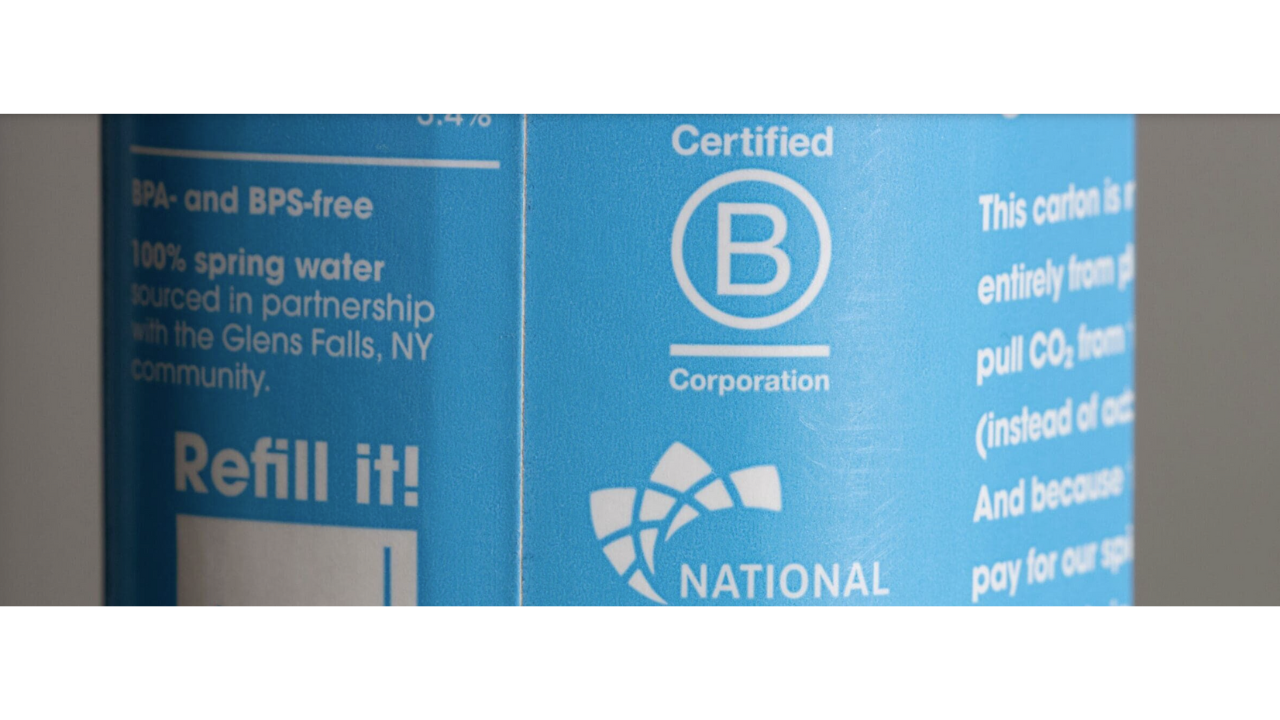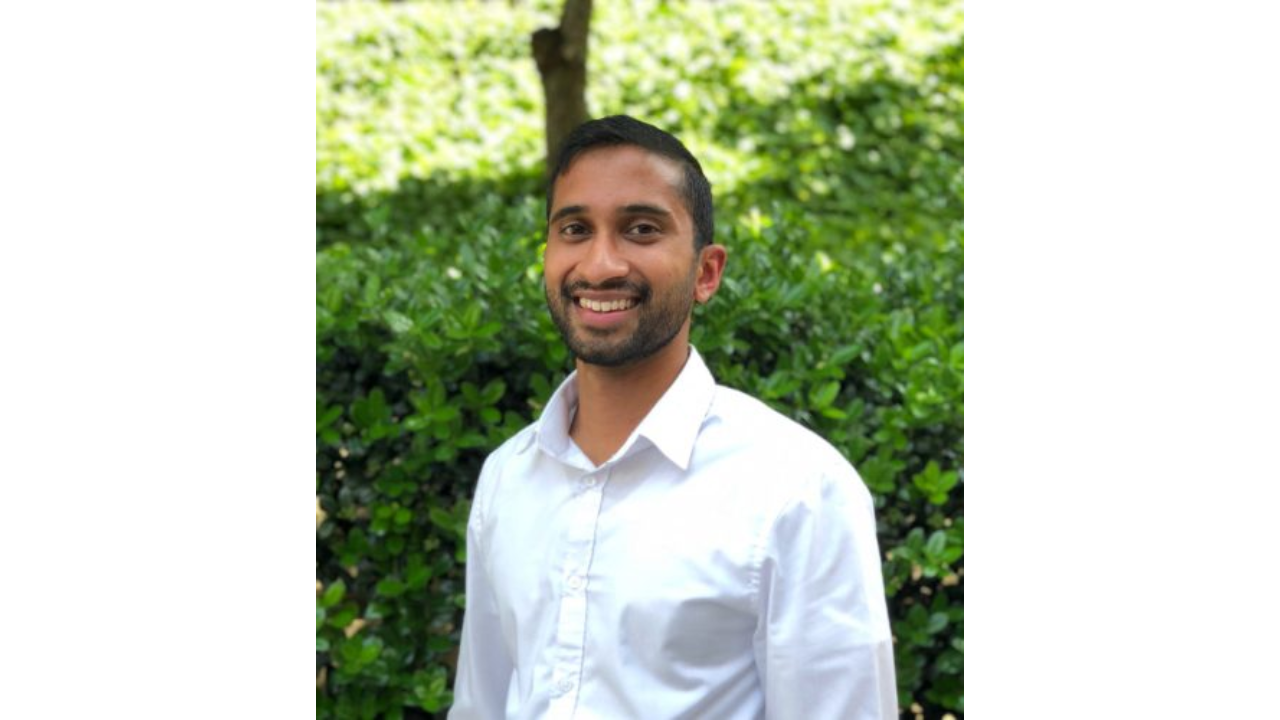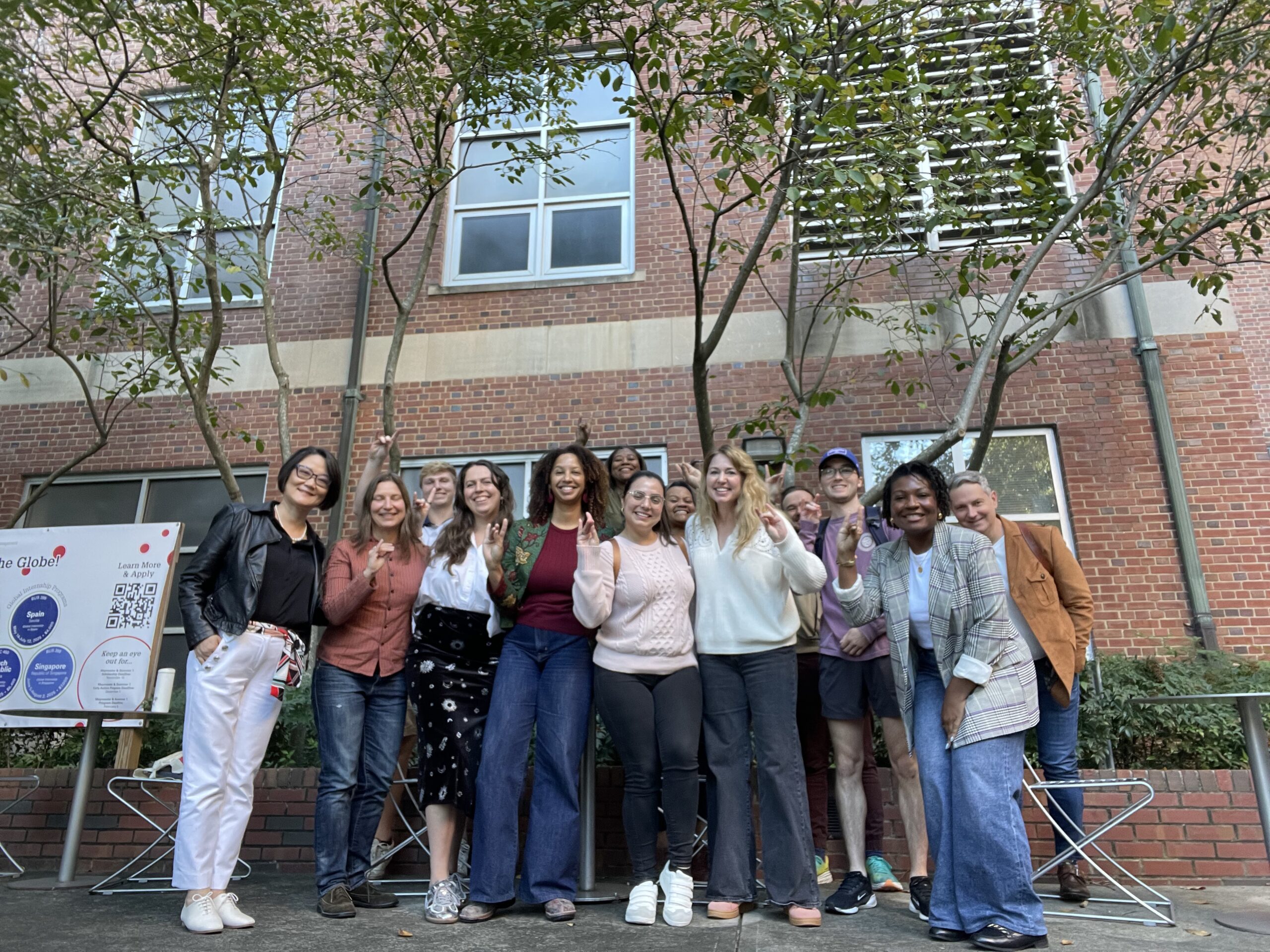NC State B Corp Clinic Helps Companies Improve their Environmental, Social Impact
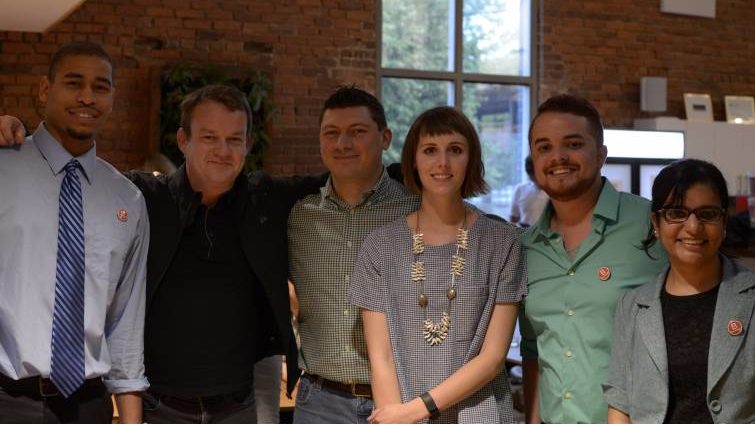
By Anna Rzewnicki, Poole College communications, and Iman Usmani, BSC Associate
On April 22 – Earth Day – 2016, the Business Sustainability Collaborative based in the NC State Poole College of Management hosted its second B Corp Clinic final presentations at HQ Raleigh. The event showcased how five teams of students from Triangle area business schools worked together to help aspiring companies move toward their goal of being certified as benefit corporations (B Corps).
The B Corp Clinic experience brings people together by making the certification process a community project, said Jessica Thomas, BSC director. It includes an experiential learning opportunity for students who study best practices in areas such as governance, workers, environmental and social impact, and also hone critical thinking skills. The clinic’s community aspect was evident in the mix of students and companies involved, and in how the B Corp Clinic itself evolved as an outreach of the Business Sustainability Collaborative.
“The B Corp Clinic is a unique program among business schools, with NC State undergraduate and graduate students from NC State’s Poole College of Management, College of Textiles, College of Engineering, and College of Natural Resources, as well as students from Fuqua School of Business at Duke University, the Kenan-Flagler Business School at UNC Chapel Hill, and Skema Business School, which has its North American campus at NC State University, all working collaboratively on sustainability focused-projects,” Thomas said. “The experience prepares students to be effective and impactful in the real business world,” she said.
The B Corp Clinic also provides an opportunity for scholarly research about B Corporations, currently being led by Rosanna Garcia, BSC faculty director, associate professor of marketing and in the Innovation + Design Chancellor’s Faculty of Excellence Cluster, and Jeffrey Pollack, assistant professor in the college’s Department of Management, Innovation and Entrepreneurship.
Creating a B Corp in three phases
Thomas began building a foundation for the B Corps Clinic in spring 2015, when BSC partnered with HQ Raleigh and the NC State Entrepreneurship Clinic, along with undergraduate and graduate Net Impact chapters and Students for Sustainable Solutions, to work with HQ Raleigh to complete that organization’s B Corp certification. The Entrepreneurship Clinic, based in Poole College and located at HQ Raleigh, provides experiential learning for NC State entrepreneurship students by pairing them with startups seeking assistance on a wide range of projects.
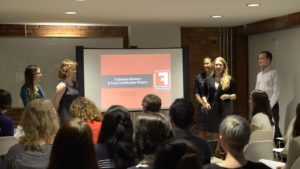 At the start of the B Corp Clinic’s work with HQ Raleigh, the organization projected that it was three points away from certification. The student team completed several projects resulting in recommendations worth 4.1 points. HQ Raleigh was recognized as a certified B Corporation earlier this year. That project was Phase 1 of BSC’s plan to establish a B Corp Clinic.
At the start of the B Corp Clinic’s work with HQ Raleigh, the organization projected that it was three points away from certification. The student team completed several projects resulting in recommendations worth 4.1 points. HQ Raleigh was recognized as a certified B Corporation earlier this year. That project was Phase 1 of BSC’s plan to establish a B Corp Clinic.
In fall 2015, BSC launched Phase 2, incorporating students at Triangle business schools. Four aspiring B Corps from the HQ Raleigh network, Vital Plan, Pendo, Lea(R)n, and Vaporware, participated in this phase, which had students working on inter-university teams with their company, in partnership with subject matter experts. The team projects provided baseline B Impact Scores and set tactical goals to help the companies improve their impact over time. Vitalplan, one of the companies from the fall B Corp Clinic, was recently recognized as a certified B Corporation.
Phase 2 was the official launch of the B Corp Clinic in October 2015. Since then, it has continued to work with members of the HQ Raleigh community and has reached out to the broader Triangle area business and academic communities.
This spring’s B Corps teams again included undergraduate and graduate students from area universities. The students were assigned to their companies based on a selection process that took into account both the students’ interests and the companies’ needs. The students worked with their companies during the spring semester to learn about and analyze the company, and then apply their knowledge to identify ways to optimize the company’s plans to help them gain as many points as possible in the B Corp assessment.
Spring 2016 B Corp Companies
Following are the companies and a brief summary of their B Corps experiences.
LYF Shoes. While the company already uses technology to analyze the water and energy usage, the student team was able to track usage and worked on ways to minimize waste. The team also focused on impacts in terms of society, cycles, health, energy, materials, and advancement, helping Lyf Shoes increase their projected points from the B Corp assessment to 172.4 out of 200.
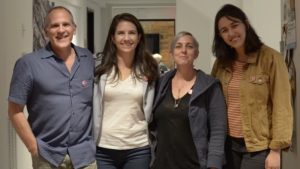 LYF Shoes Team (Left to Right)
LYF Shoes Team (Left to Right)
Steve Gilbert, Murphy’s Natural (team coach)
Shannon O’Shea, NC State, Jenkins MBA
Oami Powers, LYF Shoes
Luiza Medeiros, NC State, College of Textiles, Fashion and Textile Management
Fullsteam Brewery. This brewery has a “plot per pint” ideology. They want to celebrate the tastes and ingredients of the South in order to bring people in the community together. The student group’s suggestions included focusing on the governance, workers and the employee handbook. Results: an increase in points from 23.6 to a projected 43.6, which was ten more points than the group’s goal for the company.
Fullsteam Brewery Team (Left to Right)
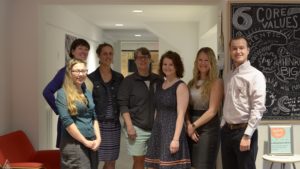 Jasmine Park, North Carolina State, College of Textiles, Fiber and Polymer Science
Jasmine Park, North Carolina State, College of Textiles, Fiber and Polymer Science
Tracy Triggs-Matthews, Associate Director, Center for Sustainable Enterprise, UNC Kenan-Flagler Business School (team coach)
Libby Rybacki, Duke University, Fuqua School of Business
Mary Beth Brandt, General Manager, Fullsteam Brewery
Shannon Cummings, UNC Kenan-Flagler Business School & Duke University, Sanford School of Public Policy
Madison Gilbert, Duke University, Fuqua School of Business
Ryan Kilgore, NC State, College of Engineering
EmployUs. This company aims to revolutionize the recruitment process by connecting employers with job seekers through trusted referrals; it also has a B Corp mission. This team also suggested that the company create a concrete employee handbook, focus on the workers and consider a waste-conscious location. The student group helped EmployUs gain 42.8 points, noting that it could gain another ten just for creating an employee handbook.
EmployUs Team (Left to Right)
 Anuradha Gupta, NC State, College of Textiles, Textile Technology Management
Anuradha Gupta, NC State, College of Textiles, Textile Technology Management
Devanjan Roy, UNC Kenan-Flagler Business School
Elizabeth Huntley, NC State, Jenkins MBA
Liz Tracy, Director, HQ Raleigh (team coach)
Ryan O’Donnell, CEO, EmployUs (NC State, Poole College, BS Business ’15)
Lulu Press. This print-on-demand company aims to make content simpler, create a more rewarding experience and allow authors an avenue to publish even if they do not have the means to. The group helped Lulu determine its weak spots and recommended updating its mission statement, evaluating certain policies, and develop a system for tracking volunteer hours to further integrate the community. The team hours helped the company increase their possible points from 37 to 87.
Lulu.com Team (Left to Right)
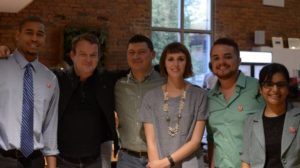 Joshua Moore, North Carolina State, College of Textiles, Sustainable Materials and Technology
Joshua Moore, North Carolina State, College of Textiles, Sustainable Materials and Technology
Nigel Lee, CEO, Lulu.com
Michael Vigars, NC State, Jenkins MBA
Sheridan Howie, Distribution Services Advocate, Lulu.com
Robert Brigman, NC State, MGIM
Radhika Vaid, NC State, PhD-Fiber and Polymer Science
Eastern Carolina Organics (ECO). ECO connects retailers and food businesses with organic produce around North Carolina and wants to eventually build a sustainable food system. The student team focused on perfecting the employee handbook, helping the company move forward, increasing its points from just over 70 points to 133 points.
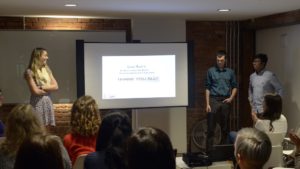 ECO Team (Left to Right)
ECO Team (Left to Right)
Rebecca Maier, UNC Kenan-Flagler MBA
Joseph Bolding, Environmental Sciences, NC State University
Imon Khan, MS in Textile Engineering, NC State University
Ryan Kilgore, a senior in chemical engineering at NC State’s College of Engineering and outgoing president of the NC State Undergraduate Net Impact Chapter, said of the experience, “I did work that was interesting and that I had not expected I would ever be doing when enrolled in college as a chemical engineer. For example, one of my projects was to put together a diversity and inclusion training (manual).” Kilgore was outgoing president of the undergraduate Net Impact Chapter at NC State and vice chairman of the Sustainability Fund Advisory Board.
Kathy Hensgen, senior vice president of operations at Lulu.com said she found her B Clinic team to be a “well-organized, welcoming ‘team’ of individuals and certified companies highly motivated to help new companies achieve their certification goals. (The) students assigned were highly talented, exceptional and above what we could have expected.”
“I think this has been a unique and exceptional experience for everyone involved. The students get an in-depth look at what it takes to become a B Corp, the clients get a needed fresh perspective on their assessment, and the B Corp Community gets new members,” said Tracy Triggs-Matthews, associate director of the Center for Sustainable Enterprise at UNC Kenan-Flagler Business School and a B Corp Clinic coach.
What is a B Corporation?
The B stands for benefit and a benefit corporation is a legal corporate structure. It is analogous to Fair Trade certification for coffee and LEED certification for buildings. Certification is managed by the nonprofit B Lab to meet rigorous standards of social and environmental performance, accountability, and transparency. Benefit Corporation is a legal corporate structure, established by law in 31 states; five other states are working on it.
The B Lab website explains B Corp as “for-profit companies certified by the nonprofit B Lab to meet rigorous standards of social and environmental performance, accountability, and transparency. Today, there is a growing community of more than 1,600 Certified B Corps from 42 countries and over 120 industries working together toward one unifying goal: to redefine success in business.” Certification, according to the site, requires meeting at least 80 points out of 200.
- Categories:
